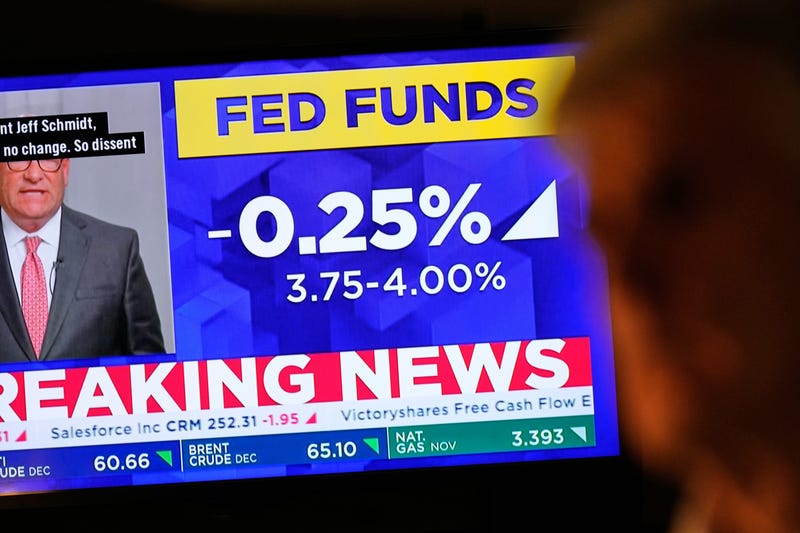
NEW YORK (AP) — U.S. stocks are edging back from their records on Wednesday after the head of the Federal Reserve warned that more cuts to interest rates, which Wall Street has been banking on, are not guaranteed.
The S&P 500 slipped 0.4% in afternoon trading. The Dow Jones Industrial Average was down 135 points, or 0.3%, as of 2:40 p.m. Eastern time, and the Nasdaq composite was 0.1% lower. All three indexes are coming off their latest all-time high.
Stocks erased what had been modest gains after Chair Jerome Powell warned that it “is not a foregone conclusion” that the Fed will cut its main interest rate again at its next meeting in December, “far from it.”
“That needs to be taken off the board,” Powell said.
His comments came about a half hour after the Fed announced its second cut of the year to its main interest rate, in hopes of helping a slowing job market.
Powell's warning hit Wall Street because many traders had seen it as a near certainty that the Fed would cut in December, along with potentially more in 2026, and they had already driven stock prices to records in part because of it. Powell said officials had “strongly differing views about how to proceed in December.”
Even Wednesday's decision to cut, which was seen as a slam dunk, came with less authority than expected. One member of the Fed's committee, Jeffrey Schmid, voted to keep the federal funds rate steady instead of lowering it.
In the meantime, the deluge continues of big U.S. companies reporting how much profit they made during the summer. The pressure is on to deliver growth because that’s one way they can quiet criticism that their stock prices have shot too high in recent months.
Teradyne soared 19.4% for the biggest gain in the S&P 500 after the company, which makes automated test equipment and advanced robotics systems, reported stronger profit for the latest quarter than analysts expected. CEO Greg Smith credited strength related to artificial-intelligence applications and said “AI-related test demand remains robust.”
Nvidia, meanwhile climbed 2.4%. It became the first company valued at $5 trillion on Wall Street, just three months after the AI darling was the first to break through the $4 trillion barrier.
Even Caterpillar, the company known for its construction and mining equipment, is feeling a boost because of AI. It rallied 11.4% after reporting stronger profit and revenue for the latest quarter than analysts expected. The strongest growth came from Caterpillar's business that provides equipment for the big data centers that are powering AI.
On the losing end of Wall Street was Fiserv, which plunged 43.8%. The payments and financial technology company reported weaker profit for the latest quarter than analysts expected, slashed its profit forecast for the year and revamped its board of directors and leadership team. The stock is heading toward its worst day since it began trading in 1986.
Mondelez International fell 5.1%, even though it reported stronger results than analysts expected. The company, whose brands include Oreo cookies and Toblerone chocolate, has been dealing with high inflation for the cost of cocoa. It expects challenging conditions to continue in some markets, though it hopes that price increases are moderating for cocoa.
In stock markets abroad, indexes were mixed in Europe following a stronger finish in Asia.
Tokyo’s Nikkei 225 jumped 2.2% to another record. Seoul’s Kospi rose 1.8% to its own all-time high after President Donald Trump met with South Korea’s leader following his visit in Japan.
Stocks rose 0.7% in Shanghai ahead of a meeting between Trump and China’s leader, Xi Jinping. The world’s two largest economies have been locked in an escalating trade war, with Washington imposing high tariffs and tightened technology controls and China retaliating with curbs on rare earth shipments, one of its key sources of leverage.
In the bond market, the yield on the 10-year Treasury rose to 4.05% from 3.99% late Tuesday as traders pared their bets for a coming cut to rates in December.
The Fed has been warning that it may have to halt cuts if inflation accelerates beyond its still-high level, because lower rates can worsen inflation.
Making an already tough course for Fed officials more difficult is the U.S. government’s shutdown. That has delayed important updates on the economy that would normally help guide the Fed’s decision-making process.
___
AP Business Writers Matt Ott and Elaine Kurtenbach contributed.